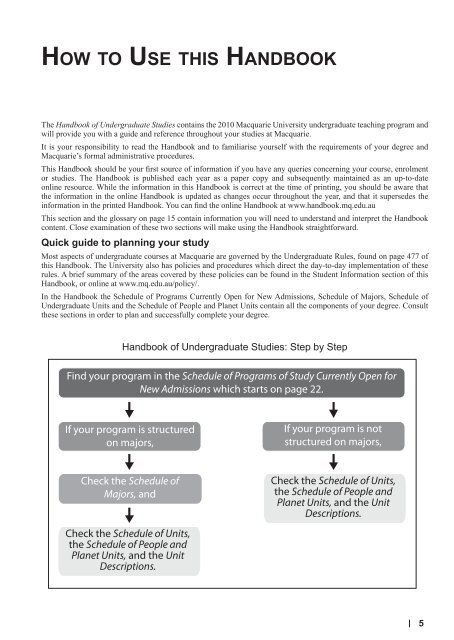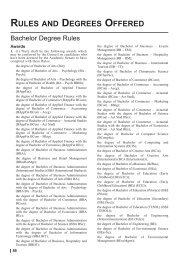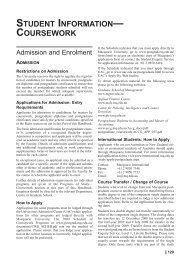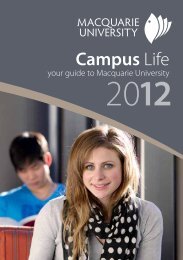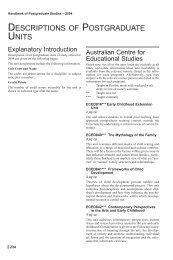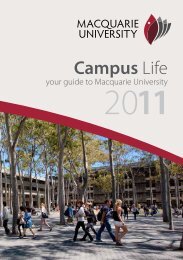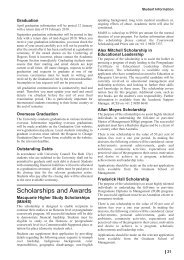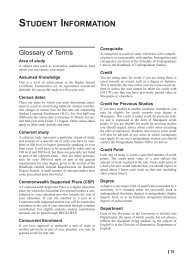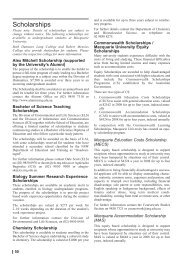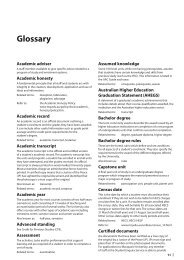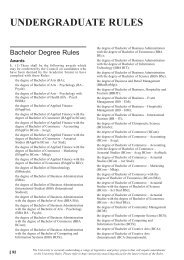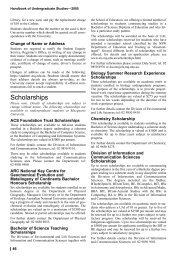HOW TO USE THIS HANDBOOK - Macquarie University Handbooks
HOW TO USE THIS HANDBOOK - Macquarie University Handbooks
HOW TO USE THIS HANDBOOK - Macquarie University Handbooks
Create successful ePaper yourself
Turn your PDF publications into a flip-book with our unique Google optimized e-Paper software.
How to Use this Handbook<br />
The Handbook of Undergraduate Studies contains the 2010 <strong>Macquarie</strong> <strong>University</strong> undergraduate teaching program and<br />
will provide you with a guide and reference throughout your studies at <strong>Macquarie</strong>.<br />
It is your responsibility to read the Handbook and to familiarise yourself with the requirements of your degree and<br />
<strong>Macquarie</strong>’s formal administrative procedures.<br />
This Handbook should be your first source of information if you have any queries concerning your course, enrolment<br />
or studies. The Handbook is published each year as a paper copy and subsequently maintained as an up-to-date<br />
online resource. While the information in this Handbook is correct at the time of printing, you should be aware that<br />
the information in the online Handbook is updated as changes occur throughout the year, and that it supersedes the<br />
information in the printed Handbook. You can find the online Handbook at www.handbook.mq.edu.au<br />
This section and the glossary on page 15 contain information you will need to understand and interpret the Handbook<br />
content. Close examination of these two sections will make using the Handbook straightforward.<br />
Quick guide to planning your study<br />
Most aspects of undergraduate courses at <strong>Macquarie</strong> are governed by the Undergraduate Rules, found on page 477 of<br />
this Handbook. The <strong>University</strong> also has policies and procedures which direct the day-to-day implementation of these<br />
rules. A brief summary of the areas covered by these policies can be found in the Student Information section of this<br />
Handbook, or online at www.mq.edu.au/policy/.<br />
In the Handbook the Schedule of Programs Currently Open for New Admissions, Schedule of Majors, Schedule of<br />
Undergraduate Units and the Schedule of People and Planet Units contain all the components of your degree. Consult<br />
these sections in order to plan and successfully complete your degree.<br />
Handbook of Undergraduate Studies: Step by Step<br />
Find your program in the Schedule of Programs of Study Currently Open for<br />
New Admissions which starts on page 22.<br />
If your program is structured<br />
on majors,<br />
If your program is not<br />
structured on majors,<br />
Check the Schedule of<br />
Majors, and<br />
Check the Schedule of Units,<br />
the Schedule of People and<br />
Planet Units, and the Unit<br />
Descriptions.<br />
Check the Schedule of Units,<br />
the Schedule of People and<br />
Planet Units, and the Unit<br />
Descriptions.<br />
5
Handbook of Undergraduate Studies—2010<br />
Step 1: Find your program<br />
Schedule of Programs of Study Currently Open for New Admissions<br />
This schedule lists all available programs as well as the general and specific minimum requirements which must be met<br />
to be eligible to graduate.<br />
The programs for Bachelor degrees are listed first, followed by programs for Certificates, Diplomas, Graduate<br />
Certificates, Graduate Diplomas and then Honours degrees. Within each of these categories the programs are listed<br />
alphabetically.<br />
Often there is more than one combination of units (or study path) which will satisfy the requirements of the program.<br />
Each program gives a sum of the minimum credit points needed to meet all requirements. Depending on the path your<br />
studies take, you may need to complete more credit points/units to meet the requirements of your program.<br />
The balance of credit points required is the difference between the total credit points required for the program and the<br />
minimum credit points needed to meet the specific minimum requirements; it represents the extra room in your program<br />
to meet general requirements or for electives.<br />
How to use the Schedule of Programs of Study<br />
Program name<br />
Program code<br />
Bachelor of Actuarial Studies<br />
Faculty:<br />
Faculty of Business and Economics<br />
Award:<br />
Bachelor of Actuarial Studies (BActStud)<br />
ACTS01<br />
General requirements: Minimum number of credit points for the degree 68<br />
Minimum number of credit points at 200 level or above 38<br />
Minimum number of credit points at 300 level or above 18<br />
Completion of a designated People unit<br />
Completion of a designated Planet unit<br />
Completion of other specific minimum requirements as set out below<br />
See the Schedule of People and<br />
Planet Units for a list of these units<br />
In order to graduate students must ensure that they have satisfied all of the general requirements<br />
of the degree: see the general requirements listed above.<br />
Unit codes<br />
Specific minimum requirements:<br />
100 level Credit points<br />
Required ACST101 Techniques and Elements of Finance 3<br />
Required ACST152 Introduction to Actuarial Studies 3<br />
Required MATH133 Mathematics IB (Advanced) 3<br />
Required STAT171 Statistical Data Analysis 3<br />
Required either MATH132 Mathematics IA (Advanced)<br />
or MATH135 Mathematics IA 3<br />
200 level<br />
Required ACST202 Mathematics of Finance 3<br />
100 level is generally first year.<br />
Required ACST212 Combinatorial Probability 3<br />
Use Required these levels as a guide ACST255 for Contingent Payments 1 3<br />
enrolment.<br />
Required STAT271 Statistics I 3<br />
Required STAT272 Probability 3<br />
300 level<br />
Capstone ACST302 Actuarial Capstone 4<br />
Required ACST354 Survival Models 4<br />
Required 7cp from ACST units at 300 level 7<br />
In some programs you may need to<br />
Balance of credit points required:<br />
Electives choose electives that count towards 23<br />
your general requirements<br />
Unit names<br />
<strong>TO</strong>TAL CREDIT POINTS REQUIRED FOR <strong>THIS</strong> PROGRAM 68<br />
Any additional information about the program will appear here<br />
6<br />
2
How to Use this Handbook<br />
The balance of credit points will vary depending on the path you take to meet the specific minimum requirements of<br />
your program. In Bachelor degrees, you will need to use this balance to meet some of the general requirements—such<br />
as People and Planet units—or you may also be able to use this balance for electives.<br />
Be sure to re-check the general requirements for your program before deciding on your electives.<br />
You should consult the requirements of your program every time you enrol, discontinue or withdraw from units of<br />
study. It is important to track your progress against your program to make sure you satisfy all requirements.<br />
Step 2: Check whether your program is structured on majors<br />
If it is, check the Schedule of Majors before you go to step 3. If not, go directly to step 3.<br />
Schedule of Majors<br />
The Schedule of Majors lists all available majors, sorted alphabetically, and their requirements.<br />
If your program requires that you complete a major, then check the Schedule of Majors—you must make sure that you<br />
meet all the requirements for that major as listed in the Schedule of Majors.<br />
Should you wish to complete an additional major, you will need to consult the Schedule of Majors to understand the<br />
requirements of the second major, and how (and if) you can fit it in with the requirements of your program.<br />
If your program does not require that you complete a major, then you cannot qualify for any major within the program—<br />
you should consult the Schedule of Undergraduate Units in conjunction with your program of study.<br />
How to use the Schedule of Majors<br />
Major name<br />
Major code<br />
Linguistics<br />
Faculty:<br />
Department:<br />
Faculty of Human Sciences<br />
Department of Linguistics<br />
LIN01<br />
This major must be completed as part of a degree. The general requirements for the degree must<br />
be satisfied in order to graduate.<br />
Unit codes<br />
Requirements for the Major:<br />
Completion of a minimum of 24 credit points including the following prescribed units:<br />
100 level Credit points<br />
Required LING110 Language: Its Structure and Use 3<br />
100 or 200 level<br />
Required 3cp from 100 level LING unit or Unit LING names 210-240 3<br />
200 level<br />
Required 6cp from LING210 - LING240 6<br />
300 level<br />
Capstone LING399 Language as Evidence 3<br />
Required 9cp from 300 level units from LING, SPH units 9<br />
<strong>TO</strong>TAL CREDIT POINTS REQUIRED <strong>TO</strong> SATISFY <strong>THIS</strong> MAJOR 24<br />
Any additional information about the major will appear here<br />
7
Handbook of Undergraduate Studies—2010<br />
Step 3: Check the details of each unit<br />
Schedule of Undergraduate Units, Unit Descriptions and Schedule of People and Planet Units<br />
Use these sections to check the details of each unit.<br />
The Schedule of Undergraduate Units lists the availability of each unit, its prerequisites, corequisites and contact hours.<br />
Units within the Schedule have been ordered alphabetically according to unit code.<br />
Every unit on offer has been assigned a name and alpha numeric identification code. The code is three or four letters<br />
to represent the subject area of the unit; followed by one digit to represent the level of the unit (1 = 100 level, 2 = 200<br />
level, 3= 300 level, 4 = 400 level, 5= 500 level) and two further digits to distinguish the particular unit. A full list of the<br />
identification codes can be found on page 11.<br />
When choosing units, it is important to understand their availability so that you can plan ahead. The ‘When Offered’<br />
column of the Schedule of Units will help you to plan your year of study.<br />
Note: this section does not contain the timetable for scheduling of individual classes; that information is available<br />
from the timetables page at www.timetables.mq.edu.au or your eStudent account.<br />
Prefixes<br />
D<br />
indicates Day, classes begin before 6pm<br />
E<br />
indicates Evening, classes begin after 6pm<br />
NHS2 indicates that the unit is offered in Northern Hemisphere Study Period 2<br />
Summer Session indicates Offered in January–February 2009 as part of the Summer School program.<br />
TBD<br />
indicates that the offering is to be determined<br />
V2 indicates Vacation study: December 2009 – February 2010<br />
WV<br />
indicates Winter vacation session<br />
X<br />
indicates External study<br />
Xc<br />
indicates Composite mode.<br />
Suffixes<br />
1 Offered in the first half-year<br />
2 Offered in the second half-year<br />
3 Offered over the full year<br />
On campus sessions<br />
Some units require you to attend an on campus session; voluntary attendance is indicated by (V), field work by (F).<br />
Please see the glossary for explanations of prerequisite, corequisite, NCCW and designation.<br />
The Schedule of People and Planet Units lists all units which have been designated as either a People or Planet unit.<br />
People units focus on the challenges of contemporary society and on what it means to be ethical, local and global<br />
citizens. Planet units help students to understand the nature of science and the challenges and issues facing the planet,<br />
with a particular focus on sustainability.<br />
Consult the Schedule of People and Planet units in conjunction with your program and, if relevant, major. You need to<br />
complete a People unit and a Planet unit to meet the requirements of your program. One of these units needs to be a<br />
unit offered outside of your Department and the other outside of your Faculty. Your Department is either the department<br />
responsible for your qualifying major or, in the case you do not have a qualifying major, the department responsible<br />
for your degree.<br />
The Unit Descriptions give a brief overview of the content of each unit as well as the academic member of staff who is<br />
the contact for the unit. This section includes the staff contact, class contact hours and the department offering each unit.<br />
Remember if you have read through this Handbook and are still unsure about your program of study—or simply want<br />
to make sure that you have understood all of your options—then please seek academic advice.<br />
8
How to Use this Handbook<br />
How to use the Schedule of Units<br />
Session Dates<br />
Credit<br />
Points Unit Designation Prerequisites Corequisites NCCW When<br />
Offered<br />
Code Name<br />
D2<br />
AHIS222 Byzantium, East and West 4 12cp AHIS322, AHST235,<br />
AHST335<br />
X2 8 October<br />
ASTR377 Astrophysics I 3 Science PHYS201(P) and PHYS202(P) MATH235 PHYS377 D1<br />
3 Science PHYS202(P) and MATH235(P) PHYS378 D2<br />
ASTR378 General Relativity and<br />
Cosmology<br />
BBA102 Principles of Management 3 Commerce;<br />
D1<br />
Economics<br />
This column lists the dates of any lecture, tutorial, block practical session or<br />
fieldwork for the unit.<br />
Eg: AHIS222 has an on campus session on 8 October.<br />
This column lists when classes for the unit are available.<br />
Eg: AHIS222 is run in the second half-year during day classes and externally.<br />
D2<br />
E1<br />
E2<br />
Summer<br />
Session<br />
BBA111 Organisational Behaviour 3 D1<br />
D2<br />
D1<br />
ECON111 or BBA103 ECON215, ECON200,<br />
ECON203<br />
BBA204 Applied Microeconomics 3 Commerce;<br />
Economics<br />
D2<br />
ECON110 or ECON111 or BBA103 ECON214, ECON201,<br />
ECON204<br />
BBA214 Applied Macroeconomics 3 Commerce;<br />
Economics<br />
BBA316 D2<br />
(Admission to BBA or BeBus or BCom or<br />
BCom-Mktg) and 24cp<br />
BBA216 Business Communications 3 Commerce;<br />
Economics<br />
BBA102 D1<br />
3 Commerce;<br />
Economics<br />
BBA280 Business Models and<br />
Organisation Structure<br />
36cp and (STAT170 or STAT171) ECON361 D1<br />
BBA315 Business Forecasting 3 Commerce;<br />
Economics<br />
D2<br />
Summer<br />
Session<br />
This column lists any units you may not count towards your degree<br />
with the unit.<br />
Eg: if you study ASTR377 you may not also count PHYS377 towards<br />
your degree.<br />
This column lists any units you may not count towards your degree with<br />
the unit.<br />
Eg: if you study ASTR377 you may not also count PHYS377 towards your<br />
degree.<br />
This column lists any units or requirements you must complete before you<br />
may enrol in the unit.<br />
Eg: ‘12 cp’ means that you must have completed at least 12 credit points before<br />
enrolling; PHYS201(P) and PHYS202(P) means you must have received at least a<br />
pass in PHYS201 and PHYS202 before enrolling.<br />
This column lists the unit’s designation/s.<br />
Eg: ASTR377 is a science unit.<br />
This column lists the credit point value of the unit.<br />
This column lists the unit name.<br />
ECON110 or ECON111 or BBA103 ECON392 D2<br />
BBA320 Asian Business Environment 3 Commerce;<br />
Economics<br />
This column lists the unit’s alphanumeric code: three or four letters followed<br />
by three digits. The letters represent the subject area, and numbers the level.<br />
Eg: AHIS222 is an Ancient History unit at 200 level.<br />
<br />
9
Unit Identification codes<br />
Abbreviation Identification Code Name Faculty Department<br />
ABEC Aboriginal Early Childhood Faculty of Human Sciences Institute of Early Childhood<br />
ABEP Aboriginal Educational Practice Faculty of Human Sciences Institute of Early Childhood<br />
ABFS Aboriginal Foundation Studies Faculty of Arts Department of Indigenous<br />
Studies—Warawara<br />
ABSP Aboriginal Studies Perspectives Faculty of Arts Department of Indigenous<br />
Studies—Warawara<br />
ABST Aboriginal Studies Faculty of Arts Department of Indigenous<br />
Studies—Warawara<br />
ACBE<br />
Academic Communication in<br />
Business and Economics<br />
Faculty of Human Sciences Department of Linguistics<br />
ACCG<br />
Accounting and Financial<br />
Management<br />
Faculty of Business and<br />
Economics<br />
Department of Accounting and<br />
Finance<br />
ACSC<br />
Academic Communication in<br />
Science<br />
Faculty of Human Sciences<br />
Department of Linguistics<br />
ACSH<br />
ACST<br />
Academic Communication in the<br />
Social Sciences and Humanities<br />
Actuarial Studies<br />
Faculty of Human Sciences<br />
Faculty of Business and<br />
Economics<br />
Department of Linguistics<br />
Department of Actuarial Studies<br />
AHIS Ancient History Faculty of Arts Department of Ancient History<br />
AHMG Ancient History Modern Greek Faculty of Arts Department of Ancient History<br />
ANTH Anthropology Faculty of Arts Department of Anthropology<br />
ASN Asian Studies Faculty of Arts Department of International<br />
Studies<br />
ASTR Astronomy Faculty of Science Department of Physics and<br />
Engineering<br />
BBA Business Administration Faculty of Business and Department of Business<br />
Economics<br />
BBE Brain, Behaviour and Evolution Faculty of Science Department of Brain, Behaviour<br />
and Evolution<br />
BCM<br />
Bachelor of Community<br />
Management<br />
Faculty of Arts<br />
Department of Indigenous<br />
Studies—Warawara<br />
BIOL Biology Faculty of Science Department of Biological Sciences<br />
BUS Business Faculty of Business and<br />
Economics<br />
BUSL Business Law Faculty of Business and<br />
Economics<br />
CBMS Chemistry Biomolecular Sciences Faculty of Science<br />
Department of Business<br />
Department of Business Law<br />
Department of Chemistry and<br />
Biomolecular Sciences<br />
CHIR Chiropractic Faculty of Science Department of Chiropractic<br />
CHN Chinese Faculty of Arts Department of International<br />
Studies<br />
COMP Computing Faculty of Science Department of Computing<br />
CRO Croatian Faculty of Arts Department of International<br />
Studies<br />
11
Handbook of Undergraduate Studies—2010<br />
Abbreviation Identification Code Name Faculty Department<br />
CUL Critical and Cultural Studies Faculty of Arts<br />
Department of Media, Music and<br />
Cultural Studies<br />
DANC Dancing Faculty of Arts Department of Media, Music and<br />
Cultural Studies<br />
DEM Demography Faculty of Business and<br />
Economics<br />
Department of Business<br />
DMTH Discrete Mathematics Faculty of Science Department of Mathematics<br />
ECH Early Childhood Education Faculty of Human Sciences Institute of Early Childhood<br />
ECHH Early Childhood Education Faculty of Human Sciences Institute of Early Childhood<br />
ECHL Early Childhood Education Faculty of Human Sciences Institute of Early Childhood<br />
ECHP Early Childhood Education Faculty of Human Sciences Institute of Early Childhood<br />
ECON<br />
Economics<br />
Faculty of Business and<br />
Economics<br />
Department of Economics<br />
ECST Early Childhood Studies Faculty of Human Sciences Institute of Early Childhood<br />
EDUC Education Faculty of Human Sciences Department of Education<br />
ELEC Electronics Faculty of Science<br />
Department of Physics and<br />
Engineering<br />
ENGG Engineering General Faculty of Science Department of Physics and<br />
Engineering<br />
ENGL English Literature Faculty of Arts Department of English<br />
ENV Environment and Geography Faculty of Science Department of Environment and<br />
Geography<br />
ENVE Environmental Science Faculty of Science Department of Environment and<br />
Geography<br />
ENVG Human Geography Faculty of Science Department of Environment and<br />
Geography<br />
EUL European Languages (general) Faculty of Arts Department of International<br />
Studies<br />
EXLW Exchange Law Study Abroad Faculty of Arts <strong>Macquarie</strong> Law School<br />
FBE<br />
Faculty of Business and Economics Faculty of Business and<br />
Economics<br />
Department of Business<br />
FIN Applied Finance Faculty of Business and<br />
Economics<br />
FOAR Faculty of Arts Faculty of Arts<br />
Department of Economics<br />
FOBE<br />
Faculty of Business and Economics Faculty of Business and<br />
Economics<br />
FOHS Faculty of Human Sciences Faculty of Human Sciences<br />
FOSC Faculty of Science Faculty of Science<br />
12
Unit Identification Codes<br />
Abbreviation Identification Code Name Faculty Department<br />
FRN French Faculty of Arts Department of International<br />
Studies<br />
GEN Gender Studies Faculty of Arts Department of Sociology<br />
GEOS Earth Sciences Faculty of Science Department of Environment and<br />
Geography<br />
GMN German Faculty of Arts<br />
Department of International<br />
Studies<br />
HLTH Health Faculty of Science Department of Chiropractic<br />
HRM<br />
Human Resource Management<br />
Faculty of Business and<br />
Economics<br />
Department of Business<br />
ICOM International Communication Faculty of Arts Department of Media, Music and<br />
Cultural Studies<br />
INFO Information Technology Faculty of Science Department of Computing<br />
INTS International Studies Faculty of Arts Department of International<br />
Studies<br />
IPBA Education and Linguistics Faculty of Human Sciences Department of Education<br />
ISYS Information Systems Faculty of Science Department of Computing<br />
ITEC Information Technology Faculty of Science Department of Computing<br />
ITL Italian Faculty of Arts Department of International<br />
Studies<br />
JPS Japanese Studies Faculty of Arts<br />
Department of International<br />
Studies<br />
LAW Law Faculty of Arts <strong>Macquarie</strong> Law School<br />
LEX Law Faculty of Arts <strong>Macquarie</strong> Law School<br />
LING Linguistics Faculty of Human Sciences Department of Linguistics<br />
MAR Marine Science Faculty of Science Department of Biological Sciences<br />
MAS Media and Communication Studies Faculty of Arts Department of Media, Music and<br />
Cultural Studies<br />
MATH Mathematics Faculty of Science Department of Mathematics<br />
MCD Macedonian Faculty of Arts Department of International<br />
Studies<br />
MGK Modern Greek Faculty of Arts Department of International<br />
Studies<br />
MHIS Modern History Faculty of Arts<br />
Department of Modern History,<br />
Politics, International Relations<br />
and Security<br />
13
Handbook of Undergraduate Studies—2010<br />
Abbreviation Identification Code Name Faculty Department<br />
MKTG Marketing Faculty of Business and<br />
Economics<br />
Department of Business<br />
MMCS Media, Music and Cultural Studies Faculty of Arts Department of Media, Music and<br />
Cultural Studies<br />
MPP Education and Linguistics Faculty of Human Sciences Department of Education<br />
MSM Museum Studies Faculty of Science Department of Environment and<br />
Geography<br />
MUS Music Faculty of Arts Department of Media, Music and<br />
Cultural Studies<br />
PHL Philosophy Faculty of Arts Department of Philosophy<br />
PHTN Photonics Faculty of Science Department of Physics and<br />
Engineering<br />
PHYS Physics Faculty of Science Department of Physics and<br />
Engineering<br />
PLH Polish Faculty of Arts Department of International<br />
Studies<br />
POL Politics Faculty of Arts<br />
Department of Modern History,<br />
Politics, International Relations<br />
and Security<br />
PSY Psychology Faculty of Human Sciences Department of Psychology<br />
RSN Russian Faculty of Arts Department of International<br />
Studies<br />
SCOM Science Communication Faculty of Science Department of Physics and<br />
Engineering<br />
SOC Sociology Faculty of Arts Department of Sociology<br />
SPED Special Education Faculty of Human Sciences Institute of Human Cognition and<br />
Brain Science<br />
SPH Speech and Hearing Faculty of Human Sciences Department of Linguistics<br />
SPN Spanish Faculty of Arts Department of International<br />
Studies<br />
SSC Social Science Faculty of Arts Department of Sociology<br />
STAE Statistics - (GradCert students) Faculty of Science Department of Statistics<br />
STAT Statistics Faculty of Science Department of Statistics<br />
TEP Teacher Education Faculty of Human Sciences Department of Education<br />
14


